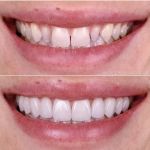
1-Understanding-Tooth-Sensitivity-and-Why-It-Happens
2-Natural-Methods-to-Relieve-Sensitivity-at-Home
3-How-to-Apply-These-Remedies-Safely
4-Personal-Stories-and-What-Actually-Helps
5-Healthy-Habits-to-Prevent-Sensitivity
6-When-to-Seek-Professional-Help
1. Understanding Tooth Sensitivity and Why It Happens
Searching for how to fix tooth sensitivity naturally at home usually means you’ve felt that sudden, sharp pain from cold water, hot coffee, or even a breath of winter air. Sensitivity most often occurs when enamel wears down or when gums recede, exposing the dentin underneath. This dentin contains tiny pathways that lead straight to your nerves, creating that uncomfortable “zing.”
Grinding, acidic foods, aggressive brushing, or even recent whitening can make sensitivity worse. Understanding the cause helps you target the right remedy instead of simply hoping the pain will go away.
2. Natural Methods to Relieve Sensitivity at Home
There are several safe and helpful ways to ease tooth sensitivity naturally—without needing strong chemicals or expensive treatments. Here are some widely recommended options:
2.1 Salt Water Rinse to Calm Irritated Nerves
A warm salt water rinse can soothe gum inflammation and reduce sensitivity. Simply mix a teaspoon of salt into a cup of warm water and swish gently for 30 seconds.
2.2 Coconut Oil Pulling to Fight Bacteria
Oil pulling with coconut oil supports gum health and reduces plaque—an important factor in tooth sensitivity. Just swish a tablespoon of coconut oil for 5–10 minutes a few times a week.
2.3 Aloe Vera Gel for Gum Recession Relief
Aloe vera can help protect exposed dentin by soothing gums and encouraging healing, especially if irritation is the root cause.
2.4 Clove Oil for Temporary Nerve Comfort
Clove oil is a natural numbing agent. Using a diluted drop near the sensitive area can provide short-term relief when pain spikes suddenly.
2.5 Green Tea Rinse for Enamel Strengthening
Green tea contains antioxidants that support enamel and reduce oral bacteria. A cooled, unsweetened rinse once a day can help sensitivity fade over time.
3. How to Apply These Remedies Safely
Natural doesn’t always mean harmless—especially when dealing with your enamel. To make sure you’re easing sensitivity instead of worsening it, keep these safety tips in mind:
3.1 Be Gentle with Your Toothbrush
Use a soft-bristled brush and avoid pressing too hard. Aggressive brushing thins enamel and exposes nerves, making sensitivity more severe.
3.2 Limit Acids Right After Exposure
If you enjoy citrus or soda, wait at least 30 minutes before brushing. Enamel softens temporarily and becomes easier to damage.
3.3 Don’t Over-use Abrasive DIY Mixtures
Some home solutions online may encourage baking soda scrubs or harsh treatments daily—but those can wear enamel down faster. Mild, consistent care is better than intense quick fixes.
4. Personal Stories and What Actually Helps
People often share how tooth sensitivity disrupts simple joys—like enjoying an ice cream cone on a sunny day. A friend recently told me she nearly stopped drinking iced coffee because every sip hurt. She tried coconut oil pulling and switched to a softer brushing routine. Within two weeks, she said mornings felt “normal again.”
Another common story involves post-whitening sensitivity. Gentle saltwater rinses plus a few days off whitening strips helped ease discomfort while still keeping results.
These real moments show that small daily habits can transform oral comfort and help you reclaim your favorite foods.
5. Healthy Habits to Prevent Sensitivity
Once you learn how to fix tooth sensitivity naturally at home, the next step is preventing flare-ups. Try incorporating these simple habits:
- Brush with smooth motions—no scrubbing
- Use lukewarm water rather than cold on sensitive days
- Enjoy acidic foods in moderation
- Stay hydrated to support saliva production, enamel’s best friend
These habits build long-term resilience for your enamel and gums.
6. When to Seek Professional Help
Natural remedies are a great start—but persistent or severe sensitivity means there may be a deeper issue like a cavity, cracked enamel, or gum disease. If your sensitivity gets worse or lasts longer than expected, a dental check is important before more damage occurs.
To explore dentist-approved products and expert guidance tailored to your specific needs, Family Dentistry Online offers trusted solutions that support both sensitivity relief and everyday oral health. The sooner you take action, the faster you can get back to eating and smiling comfortably.







 Lourdes's Dentistry - Affordable Dentist4.0 (160 review)
Lourdes's Dentistry - Affordable Dentist4.0 (160 review) Silc Periodontics4.0 (169 review)
Silc Periodontics4.0 (169 review) Doc Bresler's Cavity Busters4.0 (363 review)
Doc Bresler's Cavity Busters4.0 (363 review) McCall Family Dentistry5.0 (718 review)
McCall Family Dentistry5.0 (718 review) Justin Ewell, DMD at Suncoast Dental Goodyear0.0 (0 review)
Justin Ewell, DMD at Suncoast Dental Goodyear0.0 (0 review) Harbor Point Dental at Pelham Manor4.0 (118 review)
Harbor Point Dental at Pelham Manor4.0 (118 review) The Importance of Oral Health Education During Pregnancy for a Healthy Pregnancy
The Importance of Oral Health Education During Pregnancy for a Healthy Pregnancy Best Tips for Brushing Your Teeth Properly for Healthy Gums: Essential Techniques for Oral Health
Best Tips for Brushing Your Teeth Properly for Healthy Gums: Essential Techniques for Oral Health Why Skipping Dental Checkups Can Lead to Bigger Oral Health Problems
Why Skipping Dental Checkups Can Lead to Bigger Oral Health Problems Advantages of Porcelain Dental Restorations
Advantages of Porcelain Dental Restorations How Can Diabetes Cause Tooth and Gum Problems? Preventing and Managing Oral Health Issues
How Can Diabetes Cause Tooth and Gum Problems? Preventing and Managing Oral Health Issues Healthy Habits for Promoting Good Oral Health and Hygiene: Tips for a Healthy Smile
Healthy Habits for Promoting Good Oral Health and Hygiene: Tips for a Healthy Smile